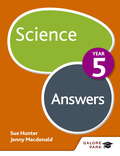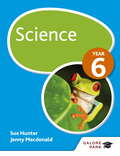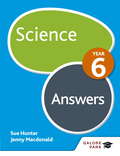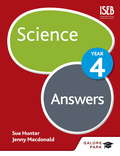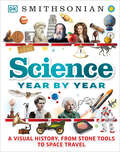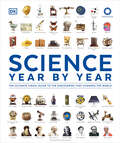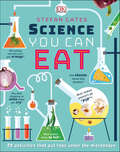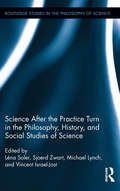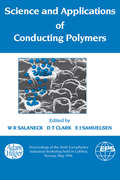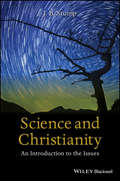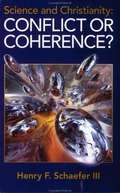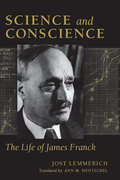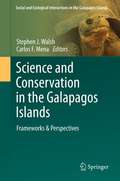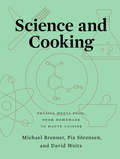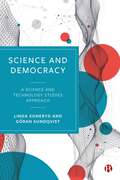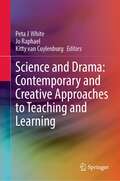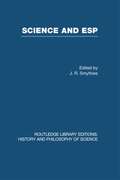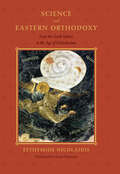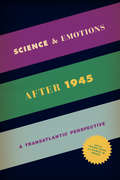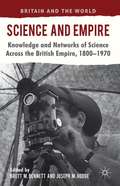- Table View
- List View
Science Year 5 Answers
by Jenny Macdonald Sue HunterClear layout saves time marking work Enables efficient assessment of pupils' strengths and weaknesses Includes diagrams and working where necessary, to demonstrate how to present answers
Science Year 6
by Jenny Macdonald Sue HunterA stimulating and rigorous approach to Science that goes beyond the requirements of the National Curriculum for Year 6 pupils (aged 10 and above) preparing for Common Entrance and other independent entrance exams at 11+ o Endorsed by ISEB to ensure full coverage of the Common Entrance 11+ syllabuso Develop key skills with clear explanations and diagramso Explore scientific concepts with lots of practical activitieso Challenge understanding with varied exercises and extension questionsGalore Park Science Year 6 Answers available to purchase from the Galore Park website: www.galorepark.co.uk
Science Year 6
by Jenny Macdonald Sue HunterExam Board: ISEBLevel: KS2Subject: ScienceFirst Teaching: September 2015First Exam: June 2017A stimulating and rigorous approach to Science that goes beyond the requirements of the National Curriculum for Year 6 pupils (aged 10 and above) preparing for Common Entrance and other independent entrance exams at 11+ o Endorsed by ISEB to ensure full coverage of the Common Entrance 11+ syllabuso Develop key skills with clear explanations and diagramso Explore scientific concepts with lots of practical activitieso Challenge understanding with varied exercises and extension questionsGalore Park Science Year 6 Answers available to purchase from the Galore Park website: www.galorepark.co.uk
Science Year 6 Answers
by Jenny Macdonald Sue HunterExam Board: ISEBLevel: KS2Subject: ScienceFirst Teaching: September 2015First Exam: Summer 2017Clear layout saves time marking work. Enables efficient assessment of pupils' strengths and weaknesses. Includes diagrams and working where necessary, to demonstrate how to present answers.
Science Year 6 Answers
by Jenny Macdonald Sue HunterClear layout saves time marking work Enables efficient assessment of pupils' strengths and weaknesses Includes diagrams and working where necessary, to demonstrate how to present answers
Science Year by Year: A Visual History, From Stone Tools to Space Travel (DK Children's Year by Year)
by DKThis epic journey of scientific discovery starts in ancient times and travels through centuries of invention before fast forwarding into the future. From simple machines to modern-day marvels, you&’ll follow incredible illustrated timelines that plot the entire history of science and highlight the most momentous discoveries. A jaw-dropping collection of more than 1,500 photographs, illustrations, maps, and graphics charts the evolution of science year by year, century by century. You&’ll meet influential inventors and famous faces from the past, including Aristotle, Leonardo da Vinci, Isaac Newton, Charles Darwin, Marie Curie, and Stephen Hawking. You&’ll visit places of scientific importance, such as prehistoric cave art, Stonehenge, Hiroshima and the first atomic bomb, the Moon landings, and the Higgs boson particle. These huge events are made simple thanks to eye-catching images, helpful timelines, and accessible, informative text. Landmark people and periods are combined in this one stunning volume for children, showcasing the ideas, experiments, and technologies that have shaped our daily lives and transformed the world today. Aspiring scientists, get ready for a time traveling trip like no other.
Science Year by Year: The Ultimate Visual Guide to the Discoveries that Changed the World (DK Definitive Visual Histories)
by DKThis epic journey of scientific discovery starts in ancient times and travels through centuries of invention before fast forwarding into the future. From simple machines to modern-day marvels, you’ll follow incredible illustrated timelines that plot the entire history of science and highlight the most momentous discoveries. A jaw-dropping collection of more than 1,500 photographs, illustrations, maps, and graphics charts the evolution of science year by year, century by century.?? You’ll meet influential inventors and famous faces from the past, including Aristotle, Leonardo da Vinci, Isaac Newton, Charles Darwin, Marie Curie, and Stephen Hawking. You’ll visit places of scientific importance, such as prehistoric cave art, Stonehenge, Hiroshima and the first atomic bomb, the Moon landings, and the Higgs boson particle. These huge events are made simple thanks to eye-catching images, helpful timelines, and accessible, informative text.?? Landmark people and periods are combined in this one stunning volume for children, showcasing the ideas, experiments, and technologies that have shaped our daily lives and transformed the world today.?? Aspiring scientists, get ready for a time traveling trip like no other.
Science You Can Eat: 20 Activities that Put Food Under the Microscope
by Stefan GatesDiscover the incredible, edible science that happens every time you cook, bake, or eat with this children's ebook that is part-cookbook, part-science reference.This exciting kids' ebook tackles all the tasty science questions you have about food - plus plenty more that you hadn't even thought of! Science You Can Eat will transform your kitchen into an awesome lab through 20 fun food experiments.This quest of gastronomic wonder is so much more than just another science ebook for kids! It explores the science of food by asking questions you're hungry to know the answers to and putting them to the test through fun experiments.Cooking is just delicious chemistry, and the science experiments in this adorable kids cookbook will prove it. Once you understand science, you understand food. Find out why popcorn goes "pop" as you test it out for yourself. Explore how taste is affected by smell, know if carrots really can turn you orange, and finally discover whether eating insects is the future of food.There is a fantastic mix of fun facts and knowledge, context, and science experiments for kids in this educational ebook. The experiments are easy to execute at home with things you have around the kitchen. The instructions are detailed but easy to understand, so some kids could even adventure solo through its pages.Enjoy the delightful weirdness of tricking your taste buds, making slime taste delicious, investigating some of the strangest flavors around, and extracting iron from your cereal! Science You Can Eat helps your little one understand what's happening with their food and why. Each page is guaranteed to leave you hungry for more - we'd wager even adults will learn a thing or two from this culinary escapade.Explore, Experiment, And Learn!Explore the world of weird, mind-blowing, and often gloriously revolting (but tasty) science behind the food we eat; from why onions make us cry to the sticky science of chewing gum.Packed with activities for kids that allow you to use the power of science in the most delicious way. You'll concoct color-changing potions, make scrumptious ice-cream in an instant, and much, much more.Embark on this incredible edible adventure with TV presenter Stefan Gates AKA &“The Gastronaut&” and turn the things we eat from the ordinary into the extraordinary. Some of food fueled science you'll learn about:- Unusual foods- The world's smelliest fruit- Salt and other marvelous minerals- Ways of cooking- Drinks that glow and so much more!
Science [Grade 4]: Ohio Edition (Harcourt Ciencias Ser.)
by Harcourt School Publishers StaffNIMAC-sourced textbook
Science a Closer Look Building Skills: Visual Literacy, Grade 6
by Jay K. Hackett Richard H. Moyer Joanne VasquezNIMAC-sourced textbook
Science after the Practice Turn in the Philosophy, History, and Social Studies of Science (Routledge Studies in the Philosophy of Science #14)
by Michael Lynch Léna Soler Sjoerd Zwart Vincent Israel-JostIn the 1980s, philosophical, historical and social studies of science underwent a change which later evolved into a turn to practice. Analysts of science were asked to pay attention to scientific practices in meticulous detail and along multiple dimensions, including the material, social and psychological. Following this turn, the interest in scientific practices continued to increase and had an indelible influence in the various fields of science studies. No doubt, the practice turn changed our conceptions and approaches of science, but what did it really teach us? What does it mean to study scientific practices? What are the general lessons, implications, and new challenges? This volume explores questions about the practice turn using both case studies and theoretical analysis. The case studies examine empirical and mathematical sciences, including the engineering sciences. The volume promotes interactions between acknowledged experts from different, often thought of as conflicting, orientations. It presents contributions in conjunction with critical commentaries that put the theses and assumptions of the former in perspective. Overall, the book offers a unique and diverse range of perspectives on the meanings, methods, lessons, and challenges associated with the practice turn.
Science and Applications of Conducting Polymers, Papers from the Sixth European Industrial Workshop
by W.R. SalaneckScience and Applications of Conducting Polymers emphasizes potential industrial applications of conducting polymers. The papers presented discuss the basic physics and chemistry of conducting polymers, followed by an in-depth examination of applications. The book is ideal for researchers in polymer physics, electronics, optics, and semiconductor physics.
Science and Christianity: An Introduction to the Issues
by J. B. StumpScience and Christianity is an accessible, engaging introduction to topics at the intersection of science and Christian theology. A philosophically orientated treatment that introduces the relationship of science to Christianity and explores to what extent the findings of science affect traditional Christian theology Addresses important theological topics in light of contemporary science, including divine action, the problem of natural evil, and eschatology Historically oriented chapters and chapters covering methodological principles for both science and theology provide the reader with a strong foundational understanding of the issues Includes feature boxes highlighting quotations, biographies of major scientists and theologians, key terms, and other helpful information Issues are presented as fairly and objectively as possible, with strengths and weaknesses of particular interpretations fully discussed
Science and Christianity: Conflict or Coherence?
by Henry F. SchaeferA science professor clearly and simply writes a series of lectures bringing together science and Christianity. This is a fascinating book.
Science and Conscience: The Life of James Franck
by Jost LemmerichJames Franck (1882-1964) was one of the twentieth century's most respected scientists, known both for his contributions to physics and for his moral courage. During the 1920s, Franck was a prominent figure in the German physics community. His research into the structure of the atom earned him the Nobel Prize in Physics in 1925. After the Nazis seized power in 1933, Franck resigned his professorship at Gottingen in protest against anti-Jewish policies. He soon emigrated to the United States, where, at the University of Chicago, he began innovative research into photosynthesis.
Science and Conservation in the Galapagos Islands
by Stephen J. Walsh Carlos F. MenaIn this launch of the Galapagos series, this book provides a broad "framing" assessment of the current status of social and ecological systems in the Galapagos Islands, and the feedback that explicitly links people to the environment. It also highlights the challenges to conservation imposed by tourism in the Galapagos Islands and the attendant migration of people from mainland Ecuador to service the burgeoning tourism industry. Further, there is an emphasize on the status of the terrestrial and marine environments that form the very foundation of the deep attraction to the Islands by tourists, residents, scholars, and conservationists.
Science and Cooking: Physics Meets Food, From Homemade To Haute Cuisine
by Michael Brenner Pia Sörensen David WeitzBased on the popular Harvard University and edX course, Science and Cooking explores the scientific basis of why recipes work. The spectacular culinary creations of modern cuisine are the stuff of countless articles and social media feeds. But to a scientist they are also perfect pedagogical explorations into the basic scientific principles of cooking. In Science and Cooking, Harvard professors Michael Brenner, Pia Sörensen, and David Weitz bring the classroom to your kitchen to teach the physics and chemistry underlying every recipe. Why do we knead bread? What determines the temperature at which we cook a steak, or the amount of time our chocolate chip cookies spend in the oven? Science and Cooking answers these questions and more through hands-on experiments and recipes from renowned chefs such as Christina Tosi, Joanne Chang, and Wylie Dufresne, all beautifully illustrated in full color. With engaging introductions from revolutionary chefs and collaborators Ferran Adria and José Andrés, Science and Cooking will change the way you approach both subjects—in your kitchen and beyond.
Science and Democracy: A Science and Technology Studies Approach
by Linda Soneryd Göran SundqvistThis accessible book introduces students to perspectives from the field of science and technology studies. Putting forward the thesis that science and democracy share important characteristics, it shows how authority cannot be taken for granted and must continuously be reproduced and confirmed by others. At a time when fundamental scientific and democratic values are being threatened by sceptics and populist arguments, an understanding of the relationship between them is much needed. This is an invaluable resource for all who are interested in the role of scientific knowledge in governance, societal developments and the implications for democracy, concerned publics and citizen engagement.
Science and Drama: Contemporary and Creative Approaches to Teaching and Learning
by Peta J White Jo Raphael Kitty Van CuylenburgThis edited volume presents interdisciplinary and transdisciplinary approaches to drama and science in education. Drawing on a solid basis of research, it offers theoretical backgrounds, showcases rich examples, and provides evidence of improved student learning and engagement. The chapters explore various connections between drama and science, including: students’ ability to engage with science through drama; dramatising STEM; mutuality and inter-relativity in drama and science; dramatic play-based outdoor activities; and creating embodied, aesthetic and affective learning experiences. The book illustrates how drama education draws upon contemporary issues and their complexity, intertwining with science education in promoting scientific literacy, creativity, and empathetic understandings needed to interpret and respond to the many challenges of our times. Findings throughout the book demonstrate how lessons learned from drama and science education can remain discrete yet when brought together, contribute to deeper, more engaged and transformative student learning.
Science and ESP (Routledge Library Editions: History & Philosophy of Science)
by J. R. SmythiesOriginally published in 1967. Representing the viewpoints of philosophers, psychologists, anthropologists, physicists, psychoanalysts, parapsychologists, psychiatrists and biologists, this volume discusses many aspects of ESP. The general theme is that the phenomena is very valid and can no longer be ignored.
Science and Eastern Orthodoxy: From the Greek Fathers to the Age of Globalization (Medicine, Science, and Religion in Historical Context)
by Efthymios NicolaidisPeople have pondered conflicts between science and religion since at least the time of Christ. The millennia-long debate is well documented in the literature in the history and philosophy of science and religion in Western civilization. Science and Eastern Orthodoxy is a departure from that vast body of work, providing the first general overview of the relationship between science and Christian Orthodoxy, the official church of the Oriental Roman Empire. This pioneering study traces a rich history over an impressive span of time, from Saint Basil’s Hexameron of the fourth century to the globalization of scientific debates in the twentieth century. Efthymios Nicolaidis argues that conflicts between science and Greek Orthodoxy—when they existed—were not science versus Christianity but rather ecclesiastical debates that traversed the whole of society. Nicolaidis explains that during the Byzantine period, the Greek fathers of the church and their Byzantine followers wrestled passionately with how to reconcile their religious beliefs with the pagan science of their ancient ancestors. What, they repeatedly asked, should be the church’s official attitude toward secular knowledge? From the rise of the Ottoman Empire in the fifteenth century to its dismantling in the nineteenth century, the patriarchate of Constantinople attempted to control the scientific education of its Christian subjects, an effort complicated by the introduction of European science in the seventeenth and eighteenth centuries. Science and Eastern Orthodoxy provides a wealth of new information concerning Orthodoxy and secular knowledge—and the reactions of the Orthodox Church to modern sciences.
Science and Emotions after 1945: A Transatlantic Perspective
by Edited by Frank Biess Daniel M. GrossThrough the first half of the twentieth century, emotions were a legitimate object of scientific study across a variety of disciplines. After 1945, however, in the wake of Nazi irrationalism, emotions became increasingly marginalized and postwar rationalism took central stage. Emotion remained on the scene of scientific and popular study but largely at the fringes as a behavioral reflex, or as a concern of the private sphere. So why, by the 1960s, had the study of emotions returned to the forefront of academic investigation? In Science and Emotions after 1945, Frank Biess and Daniel M. Gross chronicle the curious resurgence of emotion studies and show that it was fueled by two very different sources: social movements of the 1960s and brain science. A central claim of the book is that the relatively recent neuroscientific study of emotion did not initiate #150; but instead consolidated #150; the emotional turn by clearing the ground for multidisciplinary work on the emotions Science and Emotions after 1945 tells the story of this shift by looking closely at scientific disciplines in which the study of emotions has featured prominently, including medicine, psychiatry, neuroscience, and the social sciences, viewed in each case from a humanities perspective.
Science and Empire
by Brett M. Bennett Joseph M. HodgeOffering one of the first analyses of how networks of science interacted within the British Empire during the past two centuries, this volume shows how the rise of formalized state networks of science in the mid nineteenth-century led to a constant tension between administrators and scientists.
